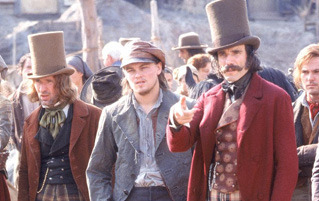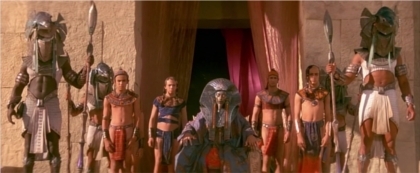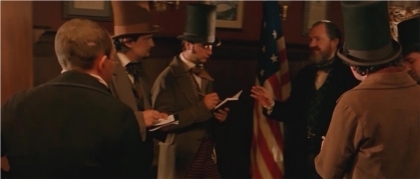5 Jokes That Get Missed In Classic Movies

Just because you can't see something, it doesn't mean it's not there. I thought everyone understood that (especially the dangerously overweight men out there). And yet I somehow keep hearing people moan about how movies don't try to appeal to the intelligent viewer, when that's clearly not the case. It's just that most of us aren't smart enough to notice when a film is trying to tickle our brain bone, which is how we missed these obscure movie jokes that have been staring us right in the face for years, like how ...
Hannibal Lecter's Most Famous Line Is Actually Complex Medical Humor

Knowledge can come from the most unlikely places. For example, I'll always know that a classy meal of fava beans and liver should be paired with Chianti wine thanks to Hannibal Lecter, the cannibal psychiatrist from The Silence Of The Lambs.

AND bestselling author of To Serve Man, Cooking With Your Friends, and PETA's Guide to Cruelty-free Meals.
You all of course know what I'm talking about. It's only the most famous line in the movie. FBI Agent Clarice Starling visits Lecter in a mental hospital because she needs help catching another serial killer, but Lecter is mainly interested in toying with her, so he talks about the time he killed a census worker and "ate his liver with some fava beans and a nice Chianti." It's a brilliant scene. It's chilling, it's great character development ... but did you know that it's also a joke?
According to a Reddit post, the mental hospital in the movie might had been treating Lecter with monoamine oxidase inhibitors ( MAOIs), which is a type of antidepressant that's fallen out of use over the years due to its dangerous side effects and potentially-lethal interactions with certain foods. People who took MAOIs had to be put on a very strict diet that forbade them from eating things like -- oh, would you look at this beautiful full circle -- liver, beans, and red wine.

Although they were advised to drink lots of tea, because a diet without tea can be deadly.
So was Lecter stealthily telling Starling that he's not taking his meds, or was he making an esoteric joke about the three foods specifically prohibited for psychiatric patients, from inside a mental hospital? I don't know, but it has given me an idea for a comedy series about Hannibal Lecter trying to make it as a Dennis-Miller-like stand-up comic. The pilot episode can be about the hilarious misunderstanding that ensues after Lecter is asked to roast someone at their birthday party.

I've always felt a sort of kinship with Roland Emmerich, because I too keep promising people hours of fun and excitement in the dark, only to then thoroughly disappoint them. Just like he did with Stargate in 1994. The idea behind it sounded brilliant -- extraterrestrials in ancient Egypt, a portal to other planets, Kurt Russell. What more could you ask for?

For Kurt to grow his hair out and wear an eye patch, obviously.
But what did it all amount to? The pre-Ultron and therefore pre-badass James Spader saving the day thanks to linguistics. At one point, he discovers the identity of the villain and a way to get back to Earth by learning how to properly read ancient Egyptian -- which is, according to Spader's character, not that hard "once you know the vowels." It's of course easy to assume that that line is about as scientifically accurate as, well, everything else in the movie. But not only is the stuff about the vowels true, it's also a hilarious treat for the Egyptologists in the audience.

And they fucking deserve a laugh after sitting through their equivalent of a minstrel show.
It turns out that ancient Egyptian hieroglyphs only represented consonants. The vowels themselves were never written down, and you were sort of supposed to figure them out based on the available letters and context. So the vowels in current transcriptions of hieroglyphs are educated guesses at best, and total shots in the dark at worst.
To learn them properly would be one of the most important breakthroughs in all of linguistics, one that should have been delivered in a tone of voice slightly more excited than that of a bored calculator. To the experts watching the movie, Spader's character basically said that he had discovered the secret to flying, and that it's "not hitting the ground."
Airplane! Has A Really Clever Political Joke Hiding In Plain Sight

What makes Airplane! such a good comedy is that it mixes different kinds of humor. If you don't like its parody of disaster movies, you can enjoy its great slapstick and surreal bits. And if you don't like that, there's always Leslie Nielsen's hilarious deadpan delivery. And if you don't like that, then I'm sorry ... I'm sorry, Unit XZ-15, for not being able to program you a soul before your escape.

Actually, fuck you, you glorified toaster. This man is a national treasure.
The only type of humor that Airplane! doesn't seem to do is political humor, but it only seems that way because you don't instantly recognize this guy:

Early on in the movie, he gets into a taxi right before the driver jumps out to chase after his ex-girlfriend, telling the passenger that he'll be back in a minute. But instead he boards the titular airplane, while the clueless customer sits in the cabwith the meter running. At the end, there's even a quick scene showing him still waiting, having accumulated hundreds of dollars in cab fare, and telling himself that he'll give the driver another 20 minutes.
On its own, it's a pretty good joke, but it becomes a million times cleverer if you know who the taxi passenger is. As it so happens, he was played by Howard Jarvis, an American businessman and politician who lowered California's property taxes by spearheading Proposition 13. And that's the joke. Jarvis, who was primarily known for his strong views on fiscal responsibility and limited spending, played a character on Airplane! who's the exact opposite of careful with money, unless he was always planning to murder and rob the driver.

Also: tax, taxi. This joke works on so many levels!
Are you laughing yet? No, probably not. An explained joke is sort of like a dissected frog: Only weirdos find them funny. Don't feel bad, though, because the entire gag is only really intended for people raised in California in the '60s, and most of them probably didn't catch it, because pot has a tendency to mess with your memory and concentration.
Gangs Of New York Makes Up For Its Mistakes With One Historically Accurate Inside Joke

Gangs Of New York is like porn for history buffs, in that you have to enjoy it for the bodily fluids spilling out of the characters on the screen and ignore all of its horrendous inaccuracies. One of the biggest liberties that Gangs took with history was probably its portrayal of political schemer Boss Tweed as a wimpy pushover who gets local gang leader Bill the Butcher (Daniel Day-Lewis) to help him gain power by beating people up and generally living up to his nickname. He then of course loses control of the man and has to run to Leonardo DiCaprio for help.

"I'm just saying. If you kill him, those future Oscars will have to go to someone ..."
In real life, though, Boss Tweed was a powerful 19th-Century kingmaker who redefined the meaning of the word "corruption." It's estimated that the combined worth of the bribes his political machine took in exchange for New York city contracts was in the billions of dollars in today's money. It's just a shame that none of that brazenness made it into the movie ... though it was hinted at.
We get a very brief background scene of Tweed talking to reporters and telling them that "What our great city needs is a new courthouse. Now I propose it should be a modest, economical structure." That's where the movie showed us a glimpse of the real Tweed, and also gave the history buffs in the audience a good laugh.

"Hahahaha! 'Great city' ... classic."
The building Tweed talked about was the New York County Courthouse which broke ground in 1861. By the time it was finished, 20 years later, it ended up costing nearly $180 million, or twice as much as the United States paid for the entire state of Alaska. Tweed paid out millions to laborers for only a few days worth of work while keeping most of the cash for himself, and had a company that he invested in supply the marble for the construction. One time, when a city committee demanded an explanation as to why the work on the building was so slow and costly, Tweed had his print shop publish the report, and charged the city $100,000 for it.
THAT's the character we could have gotten, which actually makes me think that bringing attention to it via a stealth joke was kind of a dick move. Yeah, it probably made a few people laugh, but it also reminded them that they could have been watching a shameless hybrid of Frank Underwood and Tony Soprano, instead of Bridget Jones' dad in a stupid hat.

I'm not sophisticated when it comes to food. More than once, I've eaten fried Spam straight from the pan using two old pencils as chopsticks because I didn't feel like doing the dishes. So I'm not in any position to criticize people for the foodstuff they put in their mouths. That being said, anyone who stopped drinking Merlot after seeing Sideways is a moron.

"Sorry, I can't hear you over the sound of how better I am than you."
It's true that in the movie, Paul Giamatti trash talks Merlot in favor of Pinot Noir, and we are nothing if not easily influenced by popular entertainment. The thing is that Miles, Giamatti's character, only really said: "If anyone orders Merlot, I'm leaving. I am not drinking any fucking Merlot!" That's it. That's the only time he ever mentions the wine, without going into the specifics of why he hates it, not even a "My mother was bludgeoned to death with a bottle of Merlot." He actually spends more time disparaging Cabernet Franc wine, calling it "flabby" and "overripe," and saying how he never expects greatness from it.
And those two remarks weren't put in the movie because the producers had been paid off by Big Wank, the parent industry of Big Wine Snobbery. They were there to make wine experts giggle when Miles says that his most prized possession is a bottle of a 1961 Chateau Cheval Blanc, which is actually a blend of Merlot and Cabernet Franc.
Thus proving that two wrongs sometimes do make a right.
There might be a metaphor in there somewhere seeing as Merlot was allegedly meant to be the favorite wine of Miles' ex-wife, so him drinking the Cheval Blanc at the end from a paper cup could symbolize him finally getting over her. But I think that we should look at the scene for what it really is: a classic example of irony-based humor, like showing Kanye West being able to read.
Cezary Jan Strusiewicz is a Cracked columnist, interviewer, and editor. Contact him at c.j.strusiewicz@gmail.com.
For more from Cezary, check out 5 Filthy Jokes You (And the Censors) Missed in Famous Movies and 5 Brilliant Moments You Probably Missed in Famous Movies .
Are you on reddit? Check it: We are too! Click on over to our best of Cracked subreddit.